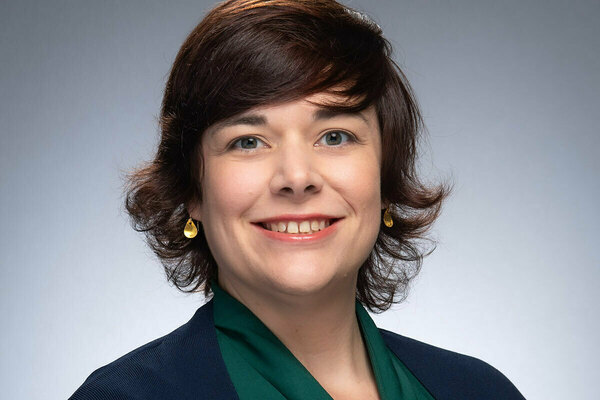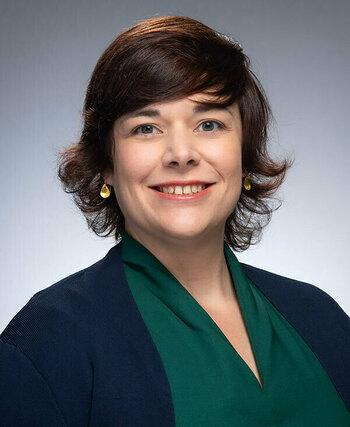

Cara Ocobock, assistant professor of anthropology, received the Human Biology Association’s 2022 Michael A. Little Early Career Award for her significant contribution to the field of human biology and the promise of more.
“I’m excited, humbled and honored,” said Ocobock, who accepted the award honoring her research, teaching, and service at the Human Biology Association’s annual meeting last month in Denver.
She is the second Notre Dame anthropologist to earn the award in the last two years, after associate professor Lee Gettler won it in 2020.
Ocobock, a biological anthropologist, also directs Notre Dame’s Human Energetics Laboratory, is a fellow of the Eck Institute for Global Health and the Institute for Educational Initiatives, a concurrent faculty member in the Department of Gender Studies, and an affiliated faculty member with the Environmental Change Initiative and the minors in health, humanities, and society and sport, media, and culture.
Her research is at the intersection of metabolic physiology, evolution, culture, and behavior, and her contributions include revelations about how people adapt to extremes — of climate and physical activity.
In sub-Arctic Finland, when assessing cold adaptations of reindeer herders, Ocobock found that female reindeer herders had significantly higher resting metabolic rates (RMR) — which maintain core body temperature among cold climate populations — than males.
“That’s never been seen before,” she said.
Among the team’s numerous discoveries, it also learned that male herders had a high degree of individual RMR variability, but females did not.
The results, published in the American Journal of Human Biology, indicate possible sex-based differences in metabolic adaptations to cold climates within this population of herders, Ocobock said.
“I’m trying to get funding to go back there. We have an idea of what hormones drive this but we’re not sure,” she said. “Scientifically and personally, I really, really like it there. The cold and dark suit me fine.”
Understanding variations in energy expenditure is key to both addressing obesity and assessing how people’s unique life history strategies evolve in their respective — and changing — environment and climate.
“What resilience are they showing and what strategies can we learn globally?” she asked.
“Strong science communication, including conveying its importance as a process, is crucial in all aspects of my job — in research, teaching, and outreach.”
Ocobock has also made intriguing discoveries about people undertaking extreme physical activity. She and colleagues found that six athletes who ran one marathon per day for 140 days in the 2015 Race Across USA cut their mean marathon time by more than 63 minutes but didn’t have an accompanying increase in heart rate.
For Ocobock, sports offer an interesting entry point into anthropology — they’re an opportunity to understand the discipline’s relevance to everyday life.
As a professor, Ocobock said her priority is to provide students — “who possess varied skills and different ways of learning” — with information that’s meaningful, engaging, and that will be relevant in their careers.
One course, Blood, Guts, and Glory: The Anthropology of Sports, covers broader social and cultural phenomena, the role of ritual in society, and how sports are used to both exclude and bring people together.
Ocobock, a former powerlifter, knows a lot about the latter. She persevered as male powerlifters at her former gym in New York state initially sexually harassed her, then eventually came to accept her.
Ocobock, who stopped lifting recently after being diagnosed with a broken back, realized that as an anthropologist she had “the perfect background” to reflect on the situation’s cultural and biological dynamics. And she wrote about the experience in “Sweating Through a Gym’s Gender Barriers” for Sapiens, an anthropology magazine.
“Change comes about slowly, one person at a time,” she wrote, “like trying to tear down an age-old mountain one fistful of rock a day.”
Ocobock is committed to sharing breakthroughs through other forms of outreach, as well.
Examples include her writing about sexism and testosterone regulations at the Olympics, and the Sausage of Science podcast she co-hosts with Christopher D. Lynn, a professor of anthropology at the University of Alabama. In each episode, they talk with graduate students and early career scientists about their research on topics such as the genetic history of the Americas, dental calculus, types of fat, immunity, and childhood cognition.
Last fall, Ocobock hosted female experts in anthropology, kinesiology, history, gender studies, political science, and digital media at her Strong As Feminist conference at Notre Dame to examine gender and intersectional identities.
Her outreach also extends to youth.
Earlier in the pandemic, when students were learning at home, Ocobock compiled a book of science experiments for her niece, Ruby. The packet included lists of needed materials, learning goals, descriptions of concepts, and profiles of female scientists. She’s since put Ruby’s Lab Manual online so more youth can take part.
“Strong science communication, including conveying its importance as a process, is crucial in all aspects of my job — in research, teaching, and outreach,” she said.
Originally published by at al.nd.edu on April 20, 2022.